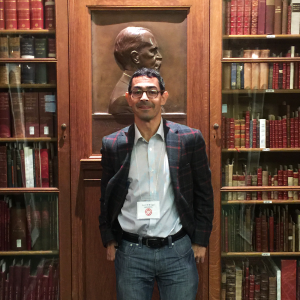Takeaway
Sprinkling a little bit of magic into whatever you are doing can make it better and more fun. The world, in general, and healthcare are both in need of plenty of magical transformation—read on for ways to get started yourself.

Lifelong Learning in Clinical Excellence | April 2, 2025 | 2 min read
By Scott Wright, MD, Johns Hopkins Medicine
“Alchemy” by Rory Sutherland is an awesome book. Thank you, Dr. Brody, for the recommendation. Historically, alchemy was thought of as a medieval chemical science and speculative philosophy aiming to achieve the transmutation of the base metals into gold, the discovery of a universal cure for disease, and the discovery of a means of indefinitely prolonging life. In our contemporary world, alchemy can be any power or process that transforms something in a mysterious, magical, or impressive way.
AND, we definitely need “magical” changes in our world, and healthcare, right about now! The ideas presented in this book sit at the intersection between psychology, marketing, and behavioral economics. Sutherland is a successful advertising executive, and he’s learned throughout his career that deeply understanding the way humans think and feel is the key to designing effective and innovative solutions.
These are a few of the key ideas and themes that stuck with me. While Sutherland argues that these are critical in marketing and business, I think they’re also relevant for the practice of medicine.
1. Embrace illogical thoughts.
Sometimes, the most effective solutions to problems don’t come from rational thinking. While logical reasoning is important and safe, we should routinely consider irrational ideas.
2. Recognize emotions.
Emotions, biases, and social factors play a significant role in decision-making. When “selling” something or helping others to decide upon the right path forward for them, pay careful attention to and ask about their feelings and emotions. An interesting example described in the book was how the packaging of a product can affect its perceived value.
3. Appreciate the impact of storytelling.
Compelling narratives engage people more than facts or data. In marketing, certain brands connect their product with a particular lifestyle or image. For example, Red Bull has created an image for their customers that goes well beyond the product itself (because “Red Bull gives you wings”).
4. Frame scenarios to induce action or alter beliefs.
Many people are significantly motivated by loss aversion; if we emphasize potential losses this can be more persuasive than focusing on gains. For example, with a patient who hasn’t been good about taking their prescribed bisphosphonate for osteoporosis, it might be most effective to try to frame the pitch that they’ll lose the accrued higher density that they already built up in their bones from their prior high compliance.
5. Prioritize innovation and creativity.
Particularly when the usual approach isn’t yielding the desired results, consider unconventional ideas that can lead to innovative solutions. The creative new way of doing something will often outperform traditional methods.
“Alchemy” was a fun read. It was packed with so many great stories that show how challenging conventional wisdom can be valuable. These are a couple of lessons that I will apply to my clinical practice in hopes of better serving and satisfying the patients that I care for:
1. When starting a new medication (e.g. antihypertensive), I will try to more explicitly tell them that I believe the treatment will work for them, and will encourage them to genuinely believe it too (with positive thoughts).
2. Because the book emphasized how much we all hate to wait, particularly if we don’t know how long it will be, I’ll work with my clinic team in our ambulatory practice to inform patients about the expected delay when I run behind schedule.
This piece expresses the views solely of the author. It does not necessarily represent the views of any organization, including Johns Hopkins Medicine.

